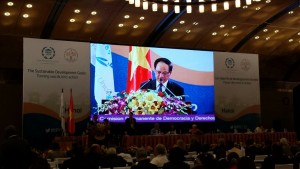
ASEAN member countries face a big challenge in keeping a delicate balance between environmental sustainability and economic development, according to the secretary general of the Association of Southeast Asian Nations (ASEAN).
ASEAN Secretary General Le Luong Minh told parliamentarians in the recent 132nd Inter Parliamentary Union (IPU) assembly held in Hanoi, Vietnam that ASEAN member c ountries, as elsewhere in the world, face this challenge despite having an abundant natural and human resources.
Luong Minh also related ASEAN proactive efforts to “ameliorate the effects of extensive development and enhanced sustainable development through all sectors of the ASEAN Pillars.”
ASEAN in now in the process of developing ASEAN’s post-2015 vision, according to the ASEAN leader.
He said there was a broad agreement on sustainable development for the ASEAN member countries.
ASEAN’s Post-2015 Vision should continue to promote inclusive, sustained and equitable economic growth and sustainable development, consistent with the UN Post- 2015 development agenda, the ASEAN Secretary General said.
ASEAN’s Post-2015 vision also aims to further narrow the development gap and socio-economic divide among and within the ASEAN Member States while ensuring a proper balance between economic development and environmental protection.
Other aims of the ASEAN Post-2015 vision is to build a resilient community which is capable of responding to emerging trends and challenges, including strong regional mechanisms to address food security, energy security, natural disasters, among others; and to strengthen regional institutional arrangements able to engage in meaningful partnerships and harness the support from all stakeholders of the Community.
“Parliamentarians play indispensable roles in the realisation of Sustainable Development Goals as they are to transpose these goals into national legislations, plans and strategies and supervise the process of implementation. To assist ASEAN in accelerating integration and its ability to sustain the process, ASEAN Parliamentarians are expected not only to communicate the ASEAN vision to the people, but also to facilitate early ratification, enforce and execute the agreements, and help harmonize legislations and policies. In the post-2015 people-centred ASEAN Community, ASEAN parliamentarians will have greater roles to play,” said a release from the ASEAN Secretariat.
The IPU, established in 1889, is an international organization consisting of the parliaments of sovereign states. It is the focal point for worldwide parliamentary dialogue that works for peace and cooperation among people. The IPU currently has 166 Member Parliaments and 10 Associate Members. Within the IPU, there are geopolitical groups which play a significant role in the work of the IPU.
Viet Nam hosted the 132nd Inter Parliamentary Union (IPU) Assembly which began on March 28 and concluded on April 2.. The Assembly comprises of a series of meetings and discussions covering issues of global concern, including international law, threats to peace and security, cyber security, and water resources under the common theme of “Sustainable Development Goals: Turning Words Into Actions.”
Le Luong Minh, the 13th ASEAN Secretary General, hails from Vietnam. (Eagle News Service with a report from ASEAN Secretariat News)








